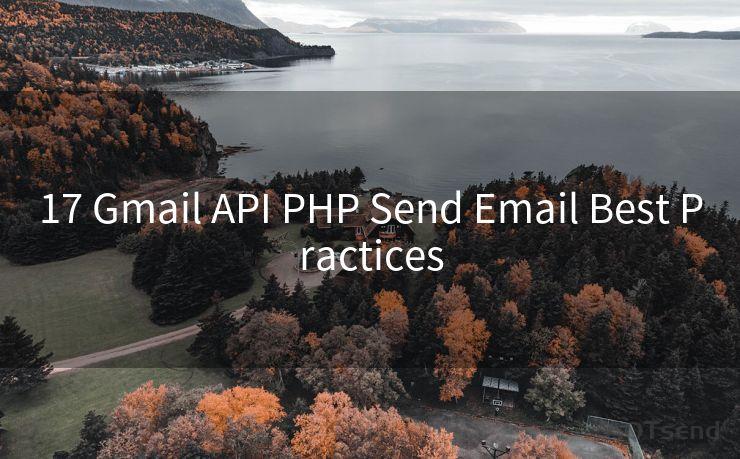17 Gmail API PHP Send Email Best Practices




Introduction
When it comes to sending emails programmatically, the Gmail API offers a robust and flexible solution. By integrating the Gmail API with PHP, developers can efficiently send emails while adhering to best practices. In this article, we'll explore the top 17 best practices for sending emails using the Gmail API and PHP.
1. Authenticate Securely
Before sending emails, ensure that you authenticate securely with OAuth 2.0. This provides a secure way to access Gmail accounts without exposing sensitive user data.
2. Use the Latest Gmail API Version
Always use the latest version of the Gmail API for the most up-to-date features and security patches.
3. Handle Errors Gracefully
Implement error handling mechanisms to catch and manage any potential issues that may arise during the email sending process.
4. Optimize Email Content
Craft your email content carefully. Use a clear and concise subject line, and ensure the body of the email is relevant and engaging.
5. Follow Email Standards
Adhere to email standards such as RFC 2822 and RFC 5322 to ensure compatibility and deliverability.
6. Manage API Quotas and Limits
Be mindful of the Gmail API's quotas and limits. Monitor your usage and adjust your code accordingly to avoid hitting these limits.
7. Utilize Batch Processing
If you need to send multiple emails, consider using batch processing to optimize performance and reduce the number of API calls.
8. Validate Email Addresses
Validate email addresses before sending to reduce bounce rates and improve deliverability.
9. Use HTML and Plain Text Versions
Provide both HTML and plain text versions of your email content to ensure compatibility with different email clients.
10. Test Email Deliverability
Regularly test your email deliverability to ensure your messages are reaching their intended recipients.

11. Handle Unsubscribe Requests
Include an unsubscribe link in your emails and respect user requests to opt-out of future communications.
12. Monitor and Analyze Performance
Track key metrics such as open rates, click-through rates, and bounce rates to assess the performance of your email campaigns.
13. Securely Store API Keys and Secrets
Protect your Gmail API keys and secrets by storing them securely, away from your codebase.
14. Use Appropriate Scopes
Only request the necessary scopes for your application to minimize privacy concerns and security risks.
15. Implement Rate Limiting
Implement rate limiting mechanisms to prevent your application from flooding the Gmail API with requests.
16. Keep Up with Best Practices
Stay updated with the latest email marketing and Gmail API best practices to ensure your emails remain effective.
17. Maintain a Clean and Organized Codebase
Write clean, maintainable code that follows PHP coding standards and best practices.
🔔🔔🔔
【AOTsend Email API】:AOTsend is a Managed Email Service for sending transactional emails. Support Email Types: reminders, authentication, confirmations, notifications, verification codes, invoices, password resets, account activations, billing statements, two-factor authentication (2FA), and one-time passwords (OTP) emails, etc. $0.28 per 1000 Emails. 99% Delivery, 98% Inbox Rate.
You might be interested in:
Why did we start the AOTsend project, Brand Story?
What is a Managed Email API, How it Works?
Best 25+ Email Marketing Platforms (Authority,Keywords&Traffic Comparison)
Best 24+ Email Marketing Service (Price, Pros&Cons Comparison)
Email APIs vs SMTP: How they Works, Any Difference?
By following these best practices, you can ensure that your emails are sent securely, efficiently, and effectively using the Gmail API and PHP. Remember to continually monitor and improve your email sending processes to maximize the impact of your communications.




Scan the QR code to access on your mobile device.
Copyright notice: This article is published by AotSend. Reproduction requires attribution.
Article Link:https://www.mailwot.com/p6658.html



